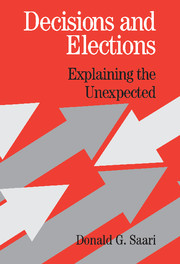3 - Explanations And Examples
Published online by Cambridge University Press: 21 May 2010
Summary
Are all methods unfair?
How frustrating. Sen's and Arrow's results appear to establish the discouraging conclusion that “no method is fair.” To explain, both of these theorems use assumptions so fundamental that, presumably, all acceptable decision procedures should satisfy them. The theorems of Arrow and Sen, however, prove that this never can happen. Consequently, any procedure — no matter whether it is intended to assist in economics, voting, or ordinary daily decisions, and no matter how carefully it may have been designed — is condemned to abuse at least one of these basic conditions.
These theorems appear to force us into an uncomfortable situation. Either we must accept and use flawed election and decision methods fully aware that that the outcome may violate the group's true intent, or we must embrace a dictator. This does not offer much of an encouraging choice.
Although this dismal and gloomy “paradox or dictator” interpretation is almost universally accepted, I emphatically disagree with it. As I show, what spares us from this uncomfortable dilemma is that, when the various axioms are combined with one another, they need not mean what we commonly thought they did. What we encounter is an effect somewhat similar to what parents quickly learn about their charming four year old child. Individually, each little darling can be attractive and predictable; the parents can rightfully brag about how their child plays quietly in a productive manner.
- Type
- Chapter
- Information
- Decisions and ElectionsExplaining the Unexpected, pp. 69 - 102Publisher: Cambridge University PressPrint publication year: 2001



